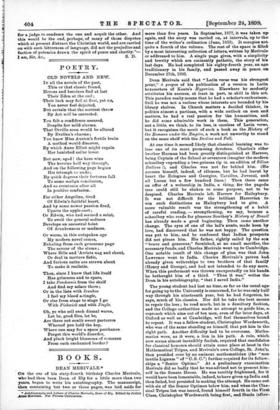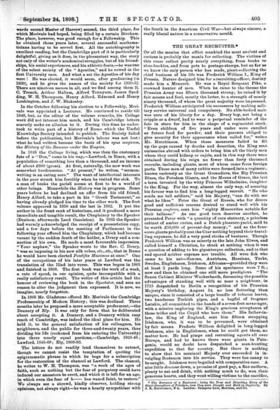BOOKS.
DEAN MERIVALE.* Ow the eve of his sixty-fourth birthday Charles Merivale, who had then been Dean of Ely for a little more than two years, began to write his autobiography. The manuscript, then containing but two or three pages, was laid aside for
• Autobiography and Letters of Charles Derivate, Dean of Ely. Edited by Judith Anne Xerivale. For Private Circulation.
more than five years. In September, 1877, it was taken up again, and the story was carried on, at intervals, up to the time of the writer's ordination (Jane, 1833). It occupies not. quite a fourth of the volume. The rest of the space is filled by a most interesting collection of letters, written by Merivale or addressed to him. A single page gives, with a simplicity and brevity which are eminently pathetic, the story of his last days. He had completed his eighty-fourth year, an age traditionary in his family, and passed away in peace ors December 27th, 1893.
Dean Merivale said that "Latin verse was his strongest point," a propos of his publication of a version in Latin hexameters of Keata's Hyperion. Elsewhere he modestly attributes his success, at least in part, to skill in this art. This paradox really means that he had a scholar's enthusiasm. Still he was not a recluse whose interests are bounded by his library shelves. In Church matters a decided thinker, in politics almost a partisan, with a wide outlook on men and matters, he had a real passion for the humanities, and be did some admirable work in them. This generatiom not a little, we think, to its loss, is careless of Latin verse, but it recognises the merit of such a book as the History of the Romans under the Empire, a work not unworthy to stand on the same shelf with the Decline and Fall.
At one time it seemed likely that classical learning was to. lose one of its most promising devotees. Charles's elder- brother Herman bad been greatly distinguished at Harrow, being Captain of the School at seventeen (imagine the modern. schoolboy expending a two guineas tip in an edition of Siliusp Italicus !), and Charles was not far behind him. (He accuses himself, indeed, of idleness, but be had learnt by heart the Eclogues and Georgics, Catullus, Jo-venal, and all Lucan but a few hundred lines.) Then there came an offer of a writership in India, a thing, for the pagoda. tree could still be shaken to some purpose, not to be- despised. Charles Merivale left Harrow for Haileybury. It was not difficult for the brilliant Harrovian to win such distinctions as Haileybury had to give. A more valuable result was the strengthening of a habit of careful reading, — strengthening, we say, because a, schoolboy who reads for pleasure Southey's History of Brazil' has already made a good beginning. Then came another. change. The eyes of one of the lad's aunts, made keen by love, had discovered that he was not happy. The question was put to him, and he confessed that Indian prospects. didnot please him. His father, rightly called by the sox "brave and generous," furnished, at no small sacrifice, the. necessary funds, and Charles Merivale went up to Cambridge. One notable result of this change of plan was that John, Lawrence went to India. Charles Merivale's patron had already given writerships to two brothers of that family (Henry and George), and had not intended to do any more. When this preferment was thrown unexpectedly on his handts. he bethought him of a third. "Thus it was," writes the- Dean in his autobiography, "that I saved India."
The young student had lost no time, so far as the usual age for going up to the University is concerned, for he was only half way through his nineteenth year, but he had forgotten, he says, much of his classics. Nor did he take the best means. to repair the loss ; he read much, but in a desultory fashion,. and the College authorities made no attempt to guide him, reproach which nine out of ten men, even of far later days, at Oxford as well as at Cambridge, will feel themselves bound- to repeat. It was a fellow-student, Christopher Wordsworth,. who was of the same standing as himself, that put him in the- right path. Another difficulty had to be overcome. Mathe- matics were, as it were, a lion in his path. A rule, which, now seems almost incredibly foolish, required that candidates- for classical honours should attain some place at least in the Mathematical Tripos, and Merivale's own College,. St. John's, then presided over by an eminent mathematician (the "non. inutile Lignum " of "C. S. C.") further required for its fellow.- ships a "Senior Optime." At a preliminary examination. Merivale did so badly that he was advised not to present him- self in the Senate House. He was terribly frightened,, for it would have been lamentable, indeed, to have given np India and then failed, but persisted in making the attempt. He came out. with six of the Senior Optimes below him, and when the Clas- sical Tripos list was issued, found himself fourth in the First Class, Christopher Wordsworth being first, and Steele (after-
wards second Master of Harrow) second, the third place, for which 2derivale had hoped, being filled by a certain Bircham. The place, however, was good enough for a Fellowship. This he obtained three years later, several successful mathema- ticians having to be served first. All the autobiography is excellent reading, but the Cambridge part of it is particularly delightful, giving as it does, in the pleasantest way, the story not only of the writer's academical struggles, but of his friend- ships, his social experiences, and his athletic feats,—he was one of the select society of the "Apostles," and he rowed in the first University race. And what a set the Apostles of his day were ! He was elected, it would seem, after graduating (In 1830), and he gives the names of the society for 1830-32. There are nineteen names in all, and we find among them R. C. Trench, Arthur Hallam, Alfred Tennyson, James Sped- ding, W. H. Thompson, Henry Alford, Edmund and Henry Lnshington, and J. W. Blakeeley.
In the October following his election to a Fellowship, Men. valewas appointed a Lecturer. He continued to reside till 1848, bat, as the editor of the volume remarks, his College work did not interest him much, and his Cambridge letters scarcely make an allusion to it. During this time he under- took to write part of a history of Rome which the Useful Knowledge Society intended to publish. The Society failed before the publication, but Merivale's labour was not lost ; what he had written became the basis of his opus magnum, the History of the Romans under the Empire.
In 1848 the College living, which was then the customary fate of a "Don," came in his way,—Lawford, in Essex, with a population of something less than a thousand, and an income of about £800 (gross). At first, naturally, the new work was somewhat burdensome. "At present," he writes, "sermon- writing is an eating sore." The want of intellectual interests in the poor struck him forcibly when he visited the sick. To a man of books the parish seems at first to be a world of other beings. Meanwhile the History was in progress. Some years before he had declined an offer from his old friend, Henry Alford, to take a part in his "Greek Testament," as having already pledged his time to the other work. The first volume appeared in 1850 and the last in 1862. It put the author in the front rank of historians, and it produced a more immediate and tangible result, the Chaplaincy to the Speaker (Denison, afterwards Lord Ossulston). In 1862 the Speaker had warmly acknowledged the receipt of a presentation copy, and a few days before the meeting of Parliament in the following year offered him the Chaplaincy, which had become vacant by the sudden death of the holder, a Drury and a con- nection of his own. He made a most favourable impression. "Your nephew," the Speaker wrote to the Rev. C. Drury, "was so imposing in his new silk robes, etc., etc., that in Rome he would have been elected Pontifez Maximus at once." One of the occupations of his later years at Lawford was the translation of the Iliad into verse. This was begun in 1865 and finished in 1868. The first book was the work of a week, a rate of speed, in our opinion, quite incompatible with a really satisfactory result. The writer of this article had the honour of reviewing the book in the Spectator, and sees no reason to alter the judgment then expressed. It is now, we imagine, nearly forgotten.
In 1868 Mr. Gladstone offered Mr. Merivale the Cambridge Professorship of Modern History; this was declined. Three months later he proposed a more acceptable preferment,—the Deanery of Ely. It was only for form that he deliberated about accepting it. A Deanery, and a Deanery within easy reach of Cambridge, was indeed the ideal place for him. He held it, to the general satisfaction of his colleagues, his neighbours, and the public for three-and-twenty years, thus dividing his life (reckoned from his entering the University) into three nearly equal portions,—Cambridge, 1826.48; Lawford, 1848-69; Ely, 1869-93.
The letters do not readily lend themselves to extract, though we cannot resist the temptation of quoting the epigrammatic phrase in which he begs for a subscription for the restoration of the chancel at Lawford. The chancel, he writes to W. H. Thompson, was "a work of the ages of faith, such as nothing but the fear of purgatory could have induced our ancestors to erect, and which it is left for an age, in which even the fear of h— has waxed faint, to restore." We always see a shrewd, kindly observer, holding strong opinions, not always right—he was a hearty sympathiser with the South in the American Civil War—but always sincere, a really liberal nature in a conservative mould.







































 Previous page
Previous page